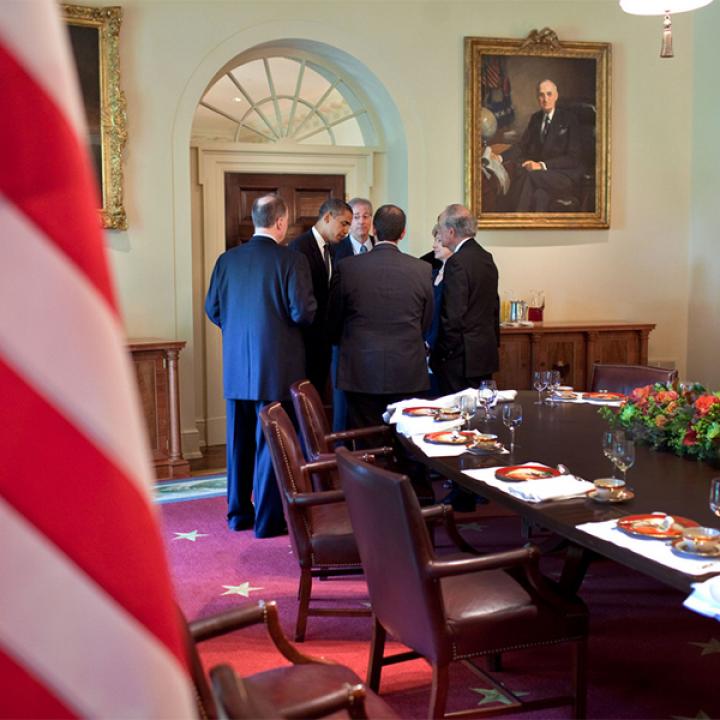

Amid talk of personnel shakeups and foreign policy retooling, a former Obama advisor suggests how the president should choose his top aides and cabinet secretaries.
As Obama turns to his second term, he knows many of the national security issues he will be facing. Many of these will be in the broader Middle East: the Iranian nuclear challenge, which will likely come to a head before the end of 2013; the role and behavior of Islamists in the Arab Awakening, first and foremost in Egypt, and the need to preserve political pluralism and secular forces capable of competing in the future; the grim reality of Syria looking more and more like a failed state, and the need to affect the balance of forces in the Syrian opposition lest the internal conflict radiate outward; the future of the Palestinian Authority and the question of whether belief in peacemaking can be sustained; the transition in Afghanistan; and the challenge of al Qaeda in North Africa -- to name just a few of the near- and longer-term challenges. Potential succession in Saudi Arabia will also have an impact on our interests and choices in the region. And, to be sure, broader questions about the European Union's economic sustainability and the international implications of the political transition in China will affect us and our economic recovery. The interplay between economics and national security policy influences my suggestions.
STROBE TALBOTT, SECRETARY OF STATE
Hillary Clinton is a tough act to follow, but Talbott brings a wealth of experience, an awareness of how different issues interconnect regionally and internationally, and an understanding of the State Department and how it operates and should operate -- especially how it should manage its missions abroad in a time of uncertainty. He understands big powers, emerging powers, and regional threats. And he understands the role of ideology in developing nations as well as the increasing importance of economics in the making of national security. He can bring a fresh perspective to challenges, having been on the outside running the Brookings Institution.
ASHTON CARTER, SECRETARY OF DEFENSE
Leon Panetta will likely stay for a transition period, and he should. But Carter, the current deputy secretary, should then become secretary. He knows doctrine, force structure, weapons acquisition, and budgets. He understands how to shape them so they respond to our policy needs and objectives. He is capable of managing the Defense Department during a time of change and he works well with the Armed Services. He is innovative and has a grasp of the full range of what will confront the secretary of defense, something that few people can claim.
ROBERT ZOELLICK, SECRETARY OF THE TREASURY
Zoellick would be an inspired choice. He is a thorough professional who knows the financial and business worlds, and he understands the workings of the global economy as few people do. As president of the World Bank, he has dealt with world leaders on growth and development, and how they relate to climate change. He is that rare combination of conceptualizer and practitioner. Given how our own economic future cannot be divorced from what happens elsewhere, particularly in China and the European Union, Zoellick would bring perspective and relationships to the job that would be invaluable. He is a Republican, and nominating him would show the president's commitment to reaching across the aisle and working with the best based on capability, not party.
MICHELE FLOURNOY, DIRECTOR OF NATIONAL INTELLIGENCE
If the president decides that he wants a change, I would go for Flournoy. She would be an unconventional choice, but she knows national security issues very well. She asks hard questions, won't accept conventional wisdom, wants assumptions validated, and understands what policy consumers need to make informed decisions. She won't cook intelligence to serve the political leadership and she appreciates what intelligence can and cannot offer.
DAVID PETRAEUS, CIA DIRECTOR
I would keep Petraeus. He has brought rigor to the agency, and is already doing a good job even though he has not been there that long. His job is not just to lead analysis but also to develop the full range of options and tools that the intelligence community needs to be able to employ to implement effective policies. He understands what that means on the ground, and the agency needs to continue to develop its assets and capabilities in this regard so that our policy choices are not reduced to sanctions or the use of military force.
TOM DONILON, NATIONAL SECURITY ADVISOR
Donilon should remain in this role. He has done a superb job, recognizing new challenges, making sure that the president gets a full range of options, staying open to new ideas, and being mindful of the risks of both action and inaction. He was the inspiration behind the pivot to Asia and he understands the meaning and stakes of what is happening with the Arab Awakening. He knows how to manage key relationships with other leaders for the president and he has the president's full confidence. With Iran requiring early decisions, most notably an endgame proposal to see if diplomacy can work, Donilon will be more needed than ever to manage the decision-making process.
HOWARD BERMAN, SECRETARY OF ENERGY
If there is going to be a new secretary of energy, I would recommend Berman, who has apparently lost his House race in California due to redistricting. As the ranking Democrat on the House Committee on Foreign Affairs, he proved to be one of the most thoughtful members of Congress. He knows national security issues, the economy, and energy and the environment, and he works effectively with members of both parties.
Dennis Ross is counselor at The Washington Institute.
Foreign Policy



